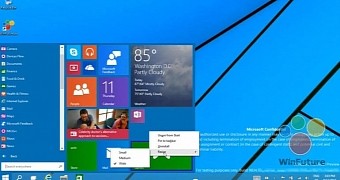Windows 9 Preview is almost here, and there’s no doubt that Microsoft’s upcoming operating system is one of the most anticipated products ever released by the company.
The number one reason for this is as simple as it could be: Microsoft promised to fix many of the annoyances in Windows 8 with the help of its upcoming operating system, so people expect Windows 9 to be revised from the ground up with features that they requested.
What’s more interesting, however, is the fact that even though we’re only two weeks away from the rumored launch of Windows 9 Preview, there are absolutely no leaks available for download, which means that until Microsoft actually unveils the product, consumers won’t have the chance to get their hands on the beta and give it a spin.
That’s perfectly normal, if you’re asking Microsoft, but in the last few years, every time Microsoft announced the public unveiling of a new operating system, leaked copies reached the web weeks or even months before this actually happened.
Leaked screenshots, but no ISOs
The word is that Microsoft has already submitted testing builds of Windows 9 to partners, but also to a number of journalists who signed confidentiality agreements to make sure that no leaks would be happening.
Of course, screenshots showing Windows 9 preview in action have already reached the web, and more are being published online on a regular basis, but there’s still one big question that remains after seeing so many photos with the new operating system.
How come nobody actually leaks a copy of Windows 9 Preview?
Microsoft communities and forums are obviously the right place to look for leaks, but there’s still no ISO that could allow you to see what’s to come in Windows sooner than September 30.
Famous Windows leakers are less active these days, and although they promised to publish Windows 9 preview online before the public launch, it appears that this isn’t actually going to happen.
All these screenshots are nothing more than living proof that some people indeed received Windows 9, so users are now wondering if the improvements that Microsoft made to the beta in order to prevent leaks are indeed the main cause of this.
Windows 8 leaker got arrested
Leaking Windows these days is surely a risky job. Earlier this year, Alex Kibkalo, a former Microsoft employee who actually published copies of Windows 8 online before the actual launch of the product, was sentenced to 3 months in prison for the theft of trade secrets.
Kibkalo was tracked down through his Hotmail account, as he communicated with a French blogger to disclose new information on Windows 8 and provide him with actual copies of the operating system.
The leaker, who worked for Microsoft for 7 years, was arrested after a long investigation started by the Redmond-based tech giant with the help of the FBI, who managed to find his location and raid his home.
The identity of the French blogger was never confirmed, but there’s no doubt that the whole case convinces some Windows leakers that Microsoft is really serious about stopping copies of its software from reaching the web.
New code to determine the identity of the leaker
Sources from within the company have indicated that Windows 9 comes with lots of improvements in terms of piracy protection, and Microsoft implemented them in the beta build as well in order to easily determine the identity of whoever publishes it online.
Basically, each Windows 9 copy includes new code that’s unique for every user who receives the beta, so in case one decides to leak it, Microsoft can itself download the preview and find out the original owner of the ISO.
Needless to say, that would have legal consequences, not to mention that the relationship with Microsoft would be basically broken.
In the end, one thing is for sure: long gone are the days when leaks allowed users to get a taste of new Windows versions before they saw daylight. At the same time, Microsoft also appears to go all in on secrecy every time it launches a new product. Secrecy is the new black at Microsoft these days.

 14 DAY TRIAL //
14 DAY TRIAL //